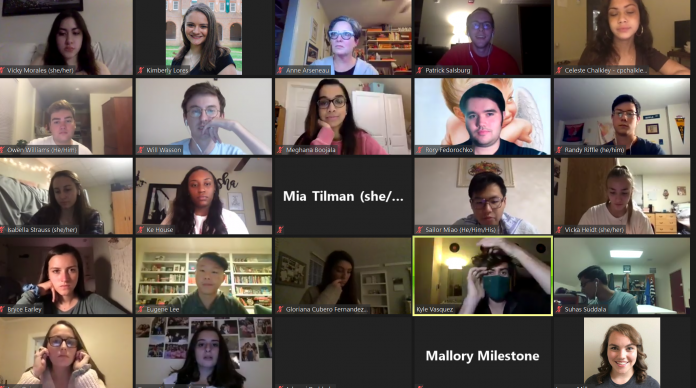At the Oct. 6 meeting of the College of William and Mary Student Assembly, senators passed the VIMS Liaison Act, which calls for the creation of an ex officio liaison to the Senate from the Virginia Institute of Marine Science. Additionally, Sen. Chair Meghana Boojala ’22 introduced an act which would allow referenda to be posed to the student body at any time of the year, and senators also listened to an introductory presentation about SA finances.
Senators overwhelmingly voted to pass the VIMS Liaison Act, which was sponsored by Boojala. This act, which had previously been tabled before being reintroduced last week, sought to implement a constitutional amendment clarifying that the Graduate Council may apportion graduate school senate seats as it sees fit, provided that all schools who desire a senator position are granted one. This is a change from the constitution’s previous language, which stated that all graduate schools must be represented by at least one senator.
The act also calls for the creation of an ex officio liaison position for VIMS, since the school has historically declined a traditional seat. The liaison will be able to attend and speak at Senate meetings, but they will not have voting privileges or face any attendance requirements.
The vote needed to be a two-thirds majority in order for the bill to pass, due to the fact that it included a constitutional amendment. The bill passed by a vote of 22-1, with the sole “no” vote cast by Sen. Patrick Salsburg ’21.
Earlier in the meeting, Boojala introduced the Referendum Reform Act, which changes the Code of the Student Assembly in order to allow for referenda to take place at any point of the academic year. Referenda are reserved for matters that impact the entire university, and they can only be posed by a two-thirds majority vote of senators, a petition signed by 500 students or a proposal from the Vice President of Student Affairs.
“why I wrote this bill right now, is because we’re in a place where we really need to gauge student opinions on really big College policies.”
The act would add language to the code allowing for the ballot platform to be used at any time of the year in order to pose a referendum to the student body. Additionally, if the referendum has been proposed through a petition from the student body, the Elections Commission will need to hold the vote within 15 academic days of receiving the petition, and all questions should be proposed to the Elections Commission at least 21 days before the referendum is held.
“But I think, why I wrote this bill right now, is because we’re in a place where we really need to gauge student opinions on really big College policies … and it was apparent that we have questions to ask the students,” Boojala said.
At the beginning of the meeting, Finance Committee Chair Sen. Eugene Lee ’23 and Secretary of Finance Darrin Lilly ’23 gave an internal finance training presentation to the senators. The presentation included information about Student Activities Fee, the Activities and Events Fund, the timeline for writing bills with funding attached, and the most efficient way to get events funded through the SA finance processes.

